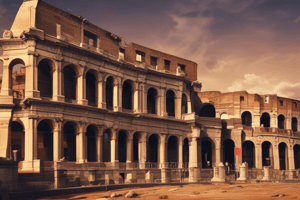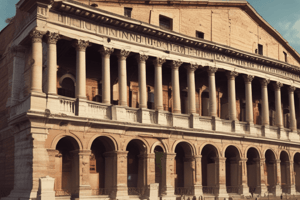Podcast
Questions and Answers
What was Caesar's primary reason for studying public speaking in Greece?
What was Caesar's primary reason for studying public speaking in Greece?
- To pursue a career in politics
- To engage in public debates
- To improve his legal arguments in court (correct)
- To prepare for military leadership
How did the political climate at the time affect Caesar's voyage to Greece?
How did the political climate at the time affect Caesar's voyage to Greece?
- There were no pirates, making travel safe
- Rome had a strong naval presence
- The Mediterranean was known for lawlessness (correct)
- The Mediterranean was generally peaceful
What was Caesar's reaction upon being captured by pirates?
What was Caesar's reaction upon being captured by pirates?
- He offered to join them as a pirate
- He demanded they release him free of charge
- He mocked them for not asking for more ransom (correct)
- He attempted to escape immediately
Which of the following was NOT a necessary skill for public speakers in ancient Rome?
Which of the following was NOT a necessary skill for public speakers in ancient Rome?
What did the pirates initially do upon capturing Caesar?
What did the pirates initially do upon capturing Caesar?
Which characteristic of Caesar contributed to his interactions with the pirates?
Which characteristic of Caesar contributed to his interactions with the pirates?
What was one significant skill that a lawyer like Caesar had to possess for legal cases?
What was one significant skill that a lawyer like Caesar had to possess for legal cases?
What did Caesar imply would happen if the pirates truly wanted to be successful?
What did Caesar imply would happen if the pirates truly wanted to be successful?
What was the political outcome of Caesar's victory in Egypt regarding Cleopatra's supporters?
What was the political outcome of Caesar's victory in Egypt regarding Cleopatra's supporters?
What was Caesar's approach to those who surrendered during his military campaigns?
What was Caesar's approach to those who surrendered during his military campaigns?
What setback did Caesar experience during his campaigns in North Africa?
What setback did Caesar experience during his campaigns in North Africa?
How did Cato the Younger respond when confronted by Caesar's forces?
How did Cato the Younger respond when confronted by Caesar's forces?
What common perception about suicide in ancient Rome does Cato's action reflect?
What common perception about suicide in ancient Rome does Cato's action reflect?
What role did Labienus play prior to his conflict with Caesar?
What role did Labienus play prior to his conflict with Caesar?
What was the last major resistance against Caesar led by Cato recognized for?
What was the last major resistance against Caesar led by Cato recognized for?
What light does Caesar's campaign against the remaining Pompeian forces shed on his military reputation?
What light does Caesar's campaign against the remaining Pompeian forces shed on his military reputation?
What was the primary reason Caesar sought vengeance against the pirates?
What was the primary reason Caesar sought vengeance against the pirates?
How did Caesar demonstrate his public image after dealing with the pirates?
How did Caesar demonstrate his public image after dealing with the pirates?
Which aspect of his character did Caesar showcase by killing the pirates swiftly?
Which aspect of his character did Caesar showcase by killing the pirates swiftly?
What role did public speaking play in Caesar's rise in Roman society?
What role did public speaking play in Caesar's rise in Roman society?
What was one of Caesar's strategies for climbing the political ladder in Rome?
What was one of Caesar's strategies for climbing the political ladder in Rome?
What did Caesar's experience with the pirates reveal about his military reputation?
What did Caesar's experience with the pirates reveal about his military reputation?
What was a common perception of Caesar in relation to his legal career?
What was a common perception of Caesar in relation to his legal career?
How did Caesar's return to Rome impact his political aspirations?
How did Caesar's return to Rome impact his political aspirations?
Flashcards
Roman Lawyer
Roman Lawyer
A skilled lawyer in ancient Rome known for public speaking abilities.
Public Speaking in Rome
Public Speaking in Rome
Public speaking in ancient Rome involved specific behaviors, gestures, and structured arguments.
Greek Speaking School
Greek Speaking School
A school in Greece focused on the art of public speaking.
Mediterranean Pirates
Mediterranean Pirates
Signup and view all the flashcards
Pirate Ransom Demand
Pirate Ransom Demand
Signup and view all the flashcards
Caesar's Witty Response
Caesar's Witty Response
Signup and view all the flashcards
Caesar's Capture
Caesar's Capture
Signup and view all the flashcards
Pirate's Folly
Pirate's Folly
Signup and view all the flashcards
Caesar's Egyptian Campaign
Caesar's Egyptian Campaign
Signup and view all the flashcards
Caesar's Middle Eastern Campaign
Caesar's Middle Eastern Campaign
Signup and view all the flashcards
Caesar's North African Campaign
Caesar's North African Campaign
Signup and view all the flashcards
Battle with Labianus
Battle with Labianus
Signup and view all the flashcards
Defeat of Cato
Defeat of Cato
Signup and view all the flashcards
Pompeian Resistance in North Africa
Pompeian Resistance in North Africa
Signup and view all the flashcards
Caesar's Victories (General)
Caesar's Victories (General)
Signup and view all the flashcards
Suicide as a Noble Act
Suicide as a Noble Act
Signup and view all the flashcards
Caesar's Revenge
Caesar's Revenge
Signup and view all the flashcards
Caesar's Mercy?
Caesar's Mercy?
Signup and view all the flashcards
Caesar's Public Image
Caesar's Public Image
Signup and view all the flashcards
Caesar's Political Climb
Caesar's Political Climb
Signup and view all the flashcards
Caesar's Legal Skill
Caesar's Legal Skill
Signup and view all the flashcards
Study Notes
Roman Wars and General Papius
- Third Servile War: Romans brutally punished revolting slaves.
- General Papius: Crucified 6000 slaves.
- Issue of civic duty and individual power in Roman government.
Roman Republic to Empire
- Rise of Marius: Military reforms.
- Food shortages: Rome relied on imports, vulnerable to disruptions.
- Political instability: Prescriptions by Sulla, legal charges, power struggles.
- Corruption: Political figures prioritized personal gain.
- Military Loyalty: Soldiers loyal to commanders rather than Rome.
Marcus Tullius Cicero
- Consul in 63 BC: Public figure in the late Republic.
- Republican ideals: Believed in civic duty and the Republic.
- Opposition to Caesar: Publicly spoke out against Caesar's power.
- Assassination: Killed in 43 BC.
Gaius Julius Caesar
- Military career: Early success in battles, awards.
- Legal career: Skilled orator and lawyer.
- Gallic Wars: Military campaigns in Gaul (modern-day France).
- Political maneuvering: Used military victories and public image to increase power.
- Influence and Control: Employed intimidation, bribes & influence peddling.
- Power Consolidation: Elevated himself through political alliances; first triumvirate.
Triumvirate
- Alliance of Caesar, Pompey and Crassus.
- Political power via alliances to take control of Rome.
- Unbalanced power dynamics.
Roman Society and Life
- Arranged marriages: Common practice in Roman society.
- Emphasis on Civic duty: importance of contribution to society; political ambitions.
- Political corruption: misuse of government power for personal gain.
Studying That Suits You
Use AI to generate personalized quizzes and flashcards to suit your learning preferences.




